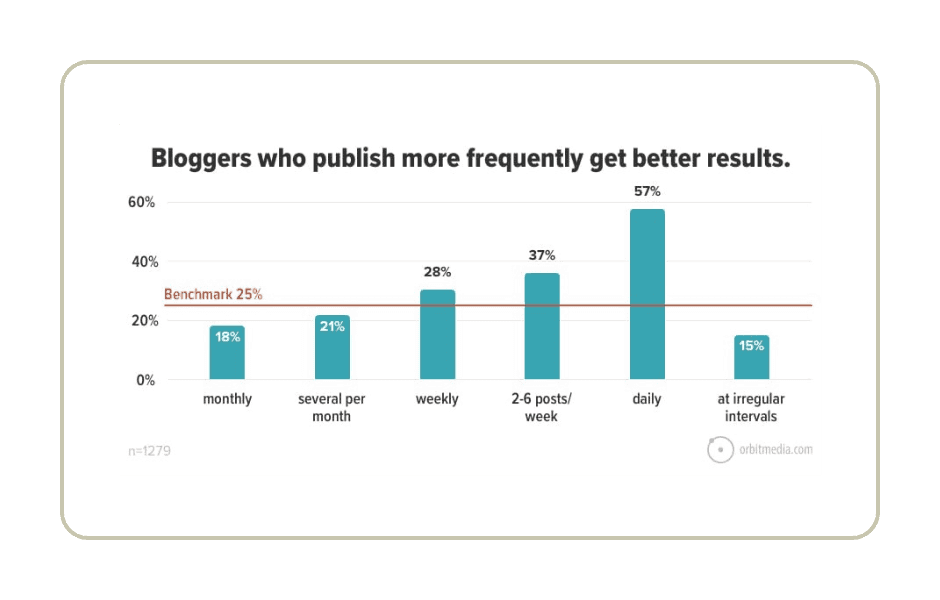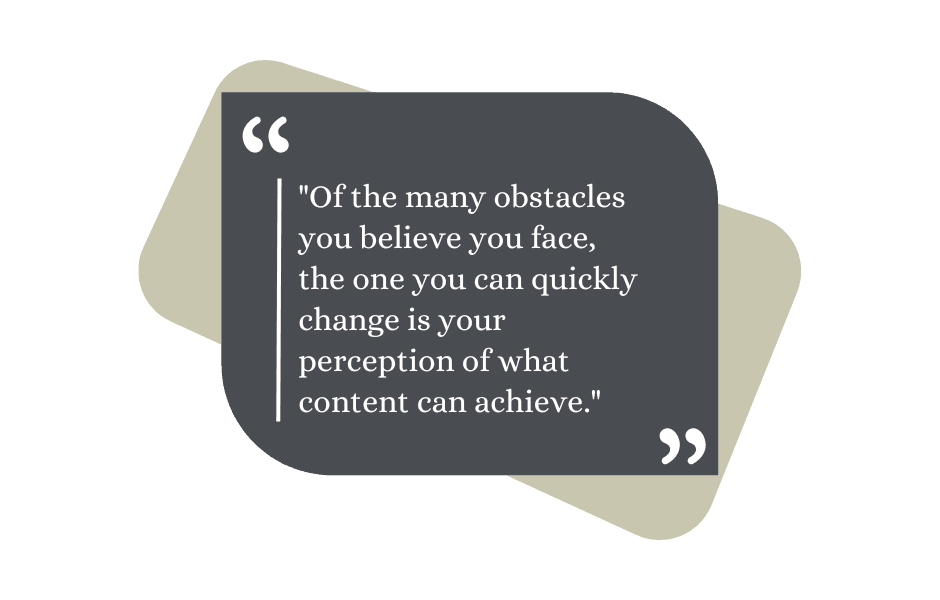The business benefits of publishing a blog as often as possible
Copywriting

Statistics about blogging are published frequently and offer insight into how successful written content is across the web.
These stats reveal interesting things, such as ideal post length, publishing frequency, content type, and so on. The numbers show the remarkable and enduring efficacy of writing. But are businesses taking blogs seriously enough?
The answer is often no. Orbit Media publishes a fantastic roundup of statistics around blogging, and when it comes to frequency of blog posts, daily posting sees the most success.

However, daily posting takes a lot of effort, which can be a serious obstacle for organisations who see blogging as a luxury that gets in the way of doing business. I’d like to argue for balance, and for altering the perception that writing isn’t worth the effort.
The obstacles against regular blog writing
The most obvious issue facing many organisations is time. I have no idea if the world is running any faster than it did 50 years ago, but it certainly feels like it. Running a business is tough. In the race to fend off competitors while making yourself as noticeable as possible, while building products or services that help people, you can easily become bogged down. Who has the time to write blogs when there’s money to be made, when the sales team need to be on the go, when marketing needs to be analysing traffic and sending newsletters?
These are valid concerns. Yet, if you look at what you want to achieve as a successful business, you may come to see – as many of my clients do – that blogging is an irreplaceable ingredient in how you sell your business. While you may not be able to commit to publishing content daily, aim for consistency first. Recognise that the blogs your company publishes are an integral component of your sales and marketing strategy.
Of the many obstacles you believe you face, the one you can quickly change is your perception of what content can achieve.

Making time to write regularly
You have to come to the realisation that creating regular business content is worth it. Without understanding its place in your business strategy, you run the risk of being an imbalanced organisation that’s reliant on one or two approaches you hope will reap rewards. For many, this reliance on luck over strategy works out. Good for them. For most of us, having a balance of skills and approaches is necessary for business success. Sales needs to be spot-on, as well as recruitment, marketing, development, leadership, and so on. Knitting these disparate pieces together are the complex threads of company values, tone of voice, character, personality and public perception. These are crucial ingredients in how your business is seen by others, how it works, and how it measures success and fulfilment.
And here’s where I say blogging is part of the process. It’s worth the effort. Effective content creation builds trust, deepens relationships, encourages repeat visits and recurring sales opportunities, improves brand reputation, search rankings (SEO), attracts new leads, and helps people connect with what you’re trying to achieve as a business.
The statistics bear this out (and show how few organisations are actively engaging in content creation). For instance, research shows that 36% of Fortune 500 companies use blogs for thought leadership, product promotion and engagement purposes. And companies that blog receive 55% more traffic to their website than those that don’t. And when it comes to SEO, those companies have 434% more indexed pages compared to those that don’t. From a sales perspective, HubSpot published research that reveals "companies that publish 16 or more blog posts per month generate 4.5x more leads than those that publish four posts (or less)".
It’s hard to argue with the statistics. It’s also hard to figure out what to write about in the first place, especially if it doesn’t come naturally to you. So let’s look at some good ideas.
Make a list, check it twice
I hope the next few paragraphs have an effect on you. What I want to happen is inspire you to create lists. I’m a sucker for lists – I write them all the time for all manner of things. I encourage you to write your own, however short, straight after you’ve finished reading this article. It will represent a start.
I’d like you to think about what it is you do. Are you a CEO? Are you a salesperson or marketing person? Are you a designer or web developer? Perhaps you’re in HR or finance and think blogging is what other people do. Here’s the answer to the conundrum of so few ideas and so little time: it’s a myth. I’ve worked with so many organisations who think they struggle with lack of time, energy, discipline, and know-how. My biggest challenge is often making businesses feel good about themselves so that they recognise the knowledge they have, where they can be more efficient with communications, and how they can connect better with their in-house values.
Here’s our first exercise. Take a small scrap of paper, or open your notes app. Take a moment and write down the two most obvious things you do. For example, if you are an office cleaner, you:
clean offices
use industrial detergents.
Recognising the most obvious things you do is the key to stretching the boundaries of your knowledge, and recognising what you know. Let’s take this further by brainstorming related words …
clean offices – tools, security, organise, cleanliness
use industrial detergents – health and safety, hygiene, cost, smell.
Now let’s look at some topic starters …
The newest tools for a cleaner office in 2021
How to remove coffee grounds from office sinks
The day in the life of an office cleaner
The importance of a stringent locking up process
Deeper cleaning in a post-Covid office environment
The 10 best cleaning detergents for walnut desks
How often should you replace your kitchen sponges
How to help the workforce understand your job better
How to remove the smell of bleach from meeting rooms
I could actually sit here for ages thinking up possible headlines for the humble office cleaner. These are the people who often go unnoticed, yet they do an invaluable service for organisations that many of us take for granted. My point is that designers feel this way too, as do salespeople, developers, marketing pros and various other professionals. We don’t big ourselves up the way we should, either because we’re afraid to come across as cocky or we prefer to feel like a martyr. Perhaps we just want to keep our heads down and take the salary each month. There’s nothing wrong with any of these, but they don’t feed into the success of a good content strategy.
So now, scribble some ideas down next to the two most obvious things you do.
What you realise about yourself isn’t enough. Yet.
You’ve got a few things written down. You could go further and come up with some potential blog titles that will help you share your knowledge. Sadly, it’s not enough. For organisations to commit to a solid content strategy, stakeholders have to buy in to the concept that content will create success. Without everyone getting this, you may abandon the content plan before you’ve even got it started.
People want to feel appreciated. It’s human nature. What they’re not always good at is expressing themselves. I know this because I’m an introvert who prefers to get on with my job and trust that no one will steal my ideas or take credit for my hard work. I manage this by owning what I do. And once I’ve owned what I’ve done, I write about it and share the knowledge. I then encourage everyone on my team to do the same, so that they take ownership and share their knowledge. If you take this project team’s knowledge to the marketing team, they should jump for joy because you’ve just delivered content they can use to help promote the business. It’s the responsibility of managers and other leaders to see these opportunities and encourage them.
In 2021, it’s not enough to be a salesperson – you have to be a salesperson, a marketing guru, a recruiter, a writer, and a presenter. Take any traditional role, and you’ll be able to do the same thing: apply multiple skill sets to make a more rounded professional. And as many people as possible have to be able to share their knowledge so that your content calendar is full to the brim.
What kind of content should you publish?
Now that you’ve hopefully inspired yourself and others to create a list of potential topics to explore that showcase your talents, let’s think about what they might look like. The marketing professionals should be able to help. For instance, they will tell you to write as much evergreen content as possible, which is content that has a long shelf life. You should write about your industry, which will enhance your authority as a voice within that industry, always on the cusp of trends and updates. Write about office life, focusing on the people who make everything work – your culture and values. Publish interviews with influential or interesting people, write opinion pieces (never be afraid to share your opinion if it helps promote your credentials as a leader in your field). Write list posts and how-to articles (these are very popular). Importantly, write about different areas of your business so that you don’t sound sales-y and disingenuous.
The marketing team will put together a content calendar and will have a steady stream of content coming from lots of different departments, viewpoints, and skill sets. You may not be able to hit the daily target, nor should you put that sort of pressure on yourself. But at least aspire to be consistent, regular and forward-thinking.
With frequent posts published to your business website, you’ll help your social channels become better tools for measuring engagement. In turn, you will become more noticeable, more engaged with the people with whom you want to connect, and more authoritative as a key player in your industry. If you thought blogging wasn’t something you had time for, think again.



